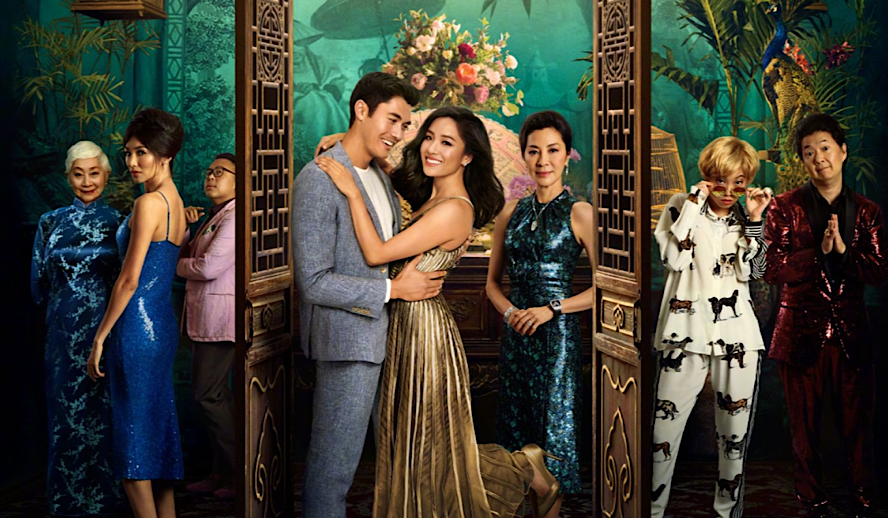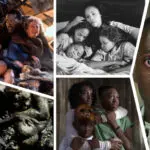Table of Contents

Photo: Diversity Win By ‘Crazy Rich Asians’/Warner Bros. Pictures
For decades, Hollywood has been toying around with the idea of diversity. It has approached the concept with cautious curiosity, poking and prodding it like a test subject prepped for experimentation, but has only recently begun to fully commit to the promises it’s been making to diversity. It’s not entirely Hollywood’s fault. After all, Hollywood started out as entertainment geared towards a specific demographic of people (white males), and has always been in part a reflection of America’s ideals and beliefs. It’s taken trial and error, but after decades’ worth of stereotypes, cliches, and generalizations, Hollywood has learned to showcase all kinds of people from all walks of life while respecting their backgrounds.
Related article: ‘In the Heights’ – Behind the Scenes and Full Commentary/Reactions from Cast & Crew
These films are some of Cinema’s finest examples of unique representation on the big screen, and have each contributed to the diversity discussion that Hollywood is now educated enough to have.
‘Moonlight’
Barry Jenkins’ ‘Moonlight’ feels like a gift rewarded to Cinema for acknowledging its own diversity problem. It’s a raw, visceral work of Cinematic excellence that combines the recurring obstacles that impede growth in the black community, with the unrelenting hardships experienced by the LGBT family. It follows Trevaente Rhodes’ Chi’ron in three different phases in his life, trying to come to grips with his sexuality which is in a constant battle with his identity. On the surface, Chi’ron’s situation seems hopeless. He’s the target of bullying, practically ostracized from his community, his mother seems to love drugs more than she does her own son, and he’s surrounded by gangsters and drug dealers that are treated as the only real leaders his community can afford.
But Jenkins finds the beauty and uniqueness hiding behind the black struggle cliches that Chi’ron finds himself at odds with. His mother isn’t a monstrous drug addict, she’s sick. And being a drug dealer isn’t something someone is, it’s what they do, with ‘Moonlight’ showing a softer, more sensitive side to the hardened gangster that even the film at times seems uncomfortable revealing. Although ‘Moonlight’s’ themes are very specific to the African American, its themes are universal. The narrative of an outsider trying to find their place in a society that rejects them for whatever reason applies to the general human experience, and is part of what makes ‘Moonlight’ such a special and rewarding piece of storytelling.
Related article: MUST WATCH – The Hollywood Insider’s CEO Pritan Ambroase’s Love Letter to Black Lives Matter – VIDEO
Subscribe to The Hollywood Insider’s YouTube Channel, by clicking here.
‘Black Panther’
‘Black Panther’ may be one of Cinema’s most crowning diversity achievements. Featuring a phenomenal cast led by Chadwick Boseman, you’d be hard-pressed to find a film that handles an all-star black cast with as much respect and reverence as ‘Black Panther’ does. Despite it being under Marvel’s prestigious umbrella, Ryan Coogler’s first superhero movie has done so much more for the African American community than I think anybody had predicted. On a surface level, the film felt like it was giving young black men and women an African American superhero that they could actually see themselves in. Before ‘Black Panther’, there were really no other notable black superheroes for African American youths to identify with. But ‘Black Panther’ was the first of its kind, showing that not only an African American superhero could lead his own film, but also be a profitable property as well.
Thanks to strong word of mouth, critically acclaimed reviews, and iconic performances, ‘Black Panther’ managed to net itself $1.3 billion at the box office, with a large portion of that box office coming from domestic sales, something that’s nearly unheard of for a billion-dollar franchise. To date, it’s one of the MCU’s highest grossing single superhero films, solidifying Black Panther’s reign as king of the MCU. Black Panther doesn’t carry the film solely on its back, though. Some would argue that the weight of Black Panther’s cultural pact is too much for one man to hold up, no matter how superhuman. T’chala’s supporting cast each participate in the heavy lifting, carrying the film proudly to the heights of its success.
Every character in ‘Black Panther’ is identifiable and relatable, from Lupita Nyong’o’s patient and nurturing Nakia, to Winston Duke’s stubborn but powerful M’Baku, these dynamic characters all add to the African American experience. And although they all have plenty of differences, the one thing they share in common is unwavering pride in their people. Whereas a film like ‘Moonlight’ might demonstrate the ugly realities of black America, Black Panther gives us insight into the power of the black community. It’s a film that was a cultural phenomenon in every sense of the word, and one that Hollywood will thank for pushing diversity forward decades from now.
‘Crazy Rich Asians’
A different kind of Asian representation was sorely needed. Although heavily featured in Cinema, films focused on an all Asian cast usually involve fancy, highly choreographed martial arts. To make matters worse, even when Asians are cast in action movies that don’t have a predominantly Asian cast, they’re often not even cast in the lead. It’s a refreshing change of pace to watch a film led by an Asian cast that isn’t dominated by Kung Fu, and ‘Crazy Rich Asians’ is the difference-maker that breaks the mold. The title of the film implies what the movie’s about. When Rachel Chu, played by Constance Wu, goes with her boyfriend to a wedding in Singapore, she discovers that her boyfriend, Nick, belongs to a wealthy family and is heavily in demand.
After this discovery, Chu attempts to win over the approval of Nick’s mother while keeping an eye out on any potential homewreckers that might be orbiting around their relationship. It’s a very familiar romance story, but its immersion in Asian culture is what separates it from other romcoms with similar story beats. ‘Crazy Rich Asians’ truly shows the narrative power of diversity, and how just focusing a familiar story around a particularly marginalized group of people can refresh the narrative and weigh it with a whole new meaning. Not only does Crazy Rich Asians portray Asians in a different light on the big screen, but it also proves that the majority of people are willing to pay to see that kind of representation. It grossed an impressive $238.5 million on its $30 million budget, making it a profitable story in its own right, so much so that Warner Bros. almost immediately greenlit a sequel after news of its success. ‘Crazy Rich Asians’ redefined how Asian Cinema is produced, broadcast, and consumed by mainstream America; a trend I hope to see continue in the future.
Related article: The Hollywood Insider’s CEO Pritan Ambroase: “The Importance of Venice Film Festival as the Protector of Cinema”
Related article: The Masters of Cinema Archives: The Hollywood Insider Pays Tribute to ‘La Vie En Rose’, Exclusive Interview with Director Olivier Dahan
Related article: – Want GUARANTEED SUCCESS? Remove these ten words from your vocabulary| Transform your life INSTANTLY
‘Parasite’
‘Parasite’, directed by Bong Joon-Ho, is another Asian-led film that not only showed the marketability and profitability of an all-Asian cast, but with foreign films in general. Unlike ‘Crazy Rich Asians’, who even though rich in Asian culture still has a story and a language that’s accessible to mainstream America, ‘Parasite’ possesses the spirit of an independent film not really catering to an audience outside of its ethnicity. It’s a proud South Korean film, filled with South Korean themes and aesthetics and spoken in Korean. Even the story itself seems like a narrative that’s outside of America’s comfort zone. An extremely poor South Korean family masquerade as affluent, sophisticated elitists in an attempt to earn the favor of an actual wealthy family. It plays like a dark, hilarious, almost twisted Cinderella rags to riches story that I can’t help but to look at as the anti ‘Crazy Rich Asians’. Despite its less friendly, digestible storytelling, ‘Parasite’ managed to take the Cinematic world by storm.
It pulled over $258.8 million worldwide on a $15.5 million budget, with $50 million of its gross coming from domestic sales. In addition to its financial success, ‘Parasite’ broke down several barriers, making and remaking history with the accolades it received. These accolades include winning the Palme d’Or at the 2020 Cannes film festival, becoming the first Korean film to do so. It also made another first at the Academy Awards when it won the 2020 Oscar for Best Picture, becoming the first-ever non-English language movie to do so. But in addition to its Best Picture win, it also received awards for Best Director, Best Original Screenplay, and Best International Feature Film, and has largely been heralded by many publications as one of the greatest movies of the 21st century. ‘Parasite’ isn’t just a triumph for Asian films, but a triumph for foreign films everywhere that have now been shown they don’t have to compromise their culture or language to achieve the success and notoriety that at one time was only reserved for American films.
Related article: ‘Moonlight’: Illuminating Communal Family Dynamics in the Black Community
Related article: ‘Crazy Rich Asians’, ‘Black Panther’ & Priyanka Chopra Eradicated White-Washing In Hollywood?
Spiderman: Into The Spiderverse’
‘Spiderman: Into The Spiderverse’ will always hold a special place in my heart for its surprising inclusion of diverse characters. ‘Spiderverse’ is an animated Spiderman film produced by Sony and directed by Bob Persichetti from a screenplay by Phil Lord and Rodney Rothman. It follows Miles Morales, a half-black half Hispanic 14-year old who, after being bitten by a spider, is imbued with superpowers similar to Spiderman’s. When he inevitably runs into the original Spiderman, Peter Parker, he’s encouraged to use his powers the same way Parker uses his; to make New York a better place. Like ‘Black Panther’, ‘Into The Spiderverse’ furthers the diversity discussion in superhero films, but in a different way. Whereas ‘Black Panther’ feels like a grand spectacle, ‘Into The Spiderverse’ hits closer to home.
As someone who grew up in both an African American and Latino environment, Morales’ home life and family dynamic felt eerily similar to my own. Almost as if his origin story was partially based on my upbringing. Morales felt like me, and others like me; an admixture of different cultural backgrounds that was acknowledged on the big screen for the first time in all of its glory. Apart from the personal connection I had with the film, ‘Into The Spiderverse’ made a significant statement about diversity that I don’t think it’s even aware of. Despite it being animated, his Brooklyn, New York is a Brooklyn that I’m well acquainted with, teeming with variety and an all-inclusive, accommodating energy that welcomes people from all walks of life.
But its greatest gift is how it doesn’t scream its diversity at the top of its lungs. It treats its setting as merely a part of life, so modest in its depiction of harmonic cultural differences that it almost comes off as unaware. It also features a dynamic cast of other Spidermen that contributes to its presentation. There’s a white Spiderman, a female Spiderman, an Asian Spiderman, showing that the Spiderman mantle doesn’t discriminate against race or gender. For the first time, Spiderman felt like it truly represented what being a New Yorker was all about.
Click here to read The Hollywood Insider’s CEO Pritan Ambroase’s love letter to Black Lives Matter, in which he tackles more than just police reform, press freedom and more – click here.
An excerpt from the love letter: The Hollywood Insider’s CEO/editor-in-chief
Just a reminder, that the Black Lives Matter movement is about more than just police brutality and extends into banking, housing, education, medical, infrastructure, etc. We have the space and time for all your stories. We believe in peaceful/non-violent protests and I would like to request the rest of media to focus on 95% of the protests that are peaceful and working effectively with positive changes happening daily. Media has a responsibility to better the world and The Hollywood Insider will continue to do so.”
Ways to support Black Lives Matter Movement to end systemic racism
More Interesting Stories From The Hollywood Insider
– Want GUARANTEED SUCCESS? Remove these ten words from your vocabulary| Transform your life INSTANTLY
– Compilation: All James Bond 007 Opening Sequences From 1962 Sean Connery to Daniel Craig
– Do you know the hidden messages in ‘Call Me By Your Name’? Find out behind the scenes facts in the full commentary and In-depth analysis of the cinematic masterpiece
– A Tribute To The Academy Awards: All Best Actor/Actress Speeches From The Beginning Of Oscars 1929-2019 | From Rami Malek, Leonardo DiCaprio To Denzel Washington, Halle Berry & Beyond | From Olivia Colman, Meryl Streep To Bette Davis & Beyond
– In the 32nd Year Of His Career, Keanu Reeves’ Face Continues To Reign After Launching Movies Earning Over $4.3 Billion In Total – “John Wick”, “Toy Story 4”, “Matrix”, And Many More
diversity, diversity, diversity, diversity, diversity, diversity, diversity, diversity, diversity, diversity, diversity, diversity, diversity, diversity, diversity, diversity, diversity, diversity, diversity, diversity, diversity

Tony Stallings is an avid follower of the entertainment industry who uses his passion for writing to relay meaningful, positive messages and narratives from the world of Hollywood. Tony doesn’t just focus on covering entertainment, but delving into it. He prides himself on focusing on the bigger picture, concerned with how entertainment culture affects and shapes the world at large with utmost honesty. Tony’s dedication to journalistic integrity, reliability and passion is a common bond that he shares with Hollywood Insider, and he’s eager to help people recognize the value of entertainment through their platform.








